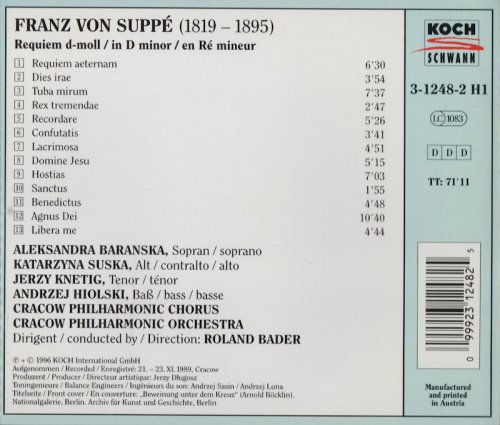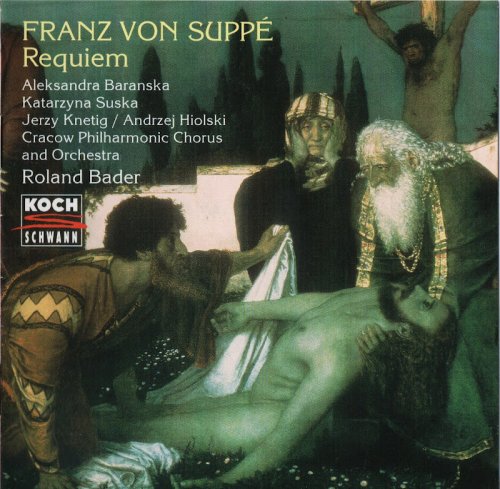
Cracow Philharmonic Orchestra, Roland Bader - Franz von Suppé: Requiem (1996)
BAND/ARTIST: Cracow Philharmonic Orchestra, Roland Bader
- Title: Franz von Suppé: Requiem
- Year Of Release: 1996
- Label: Koch Schwann
- Genre: Classical
- Quality: FLAC (image+.cue,log,scans)
- Total Time: 71:11
- Total Size: 289 Mb
- WebSite: Album Preview
Tracklist:
Franz von Suppé (1819-1895)
Requiem in D minor
1. Requiem eternam
2. Dies irae
3. Tuba mirum
4. Rex tremendae
5. Recordare
6. Confutatis
7. Lacrimosa
8. Domine Jesu
9. Hostias
10. Sanctus
11. Benedictus
12. Agnus Dei
13. Libera me
Performers:
Aleksandra Baranska - soprano
Katarzyna Suska - contralto
Jerzy Knetig - tenor
Andrzej Hiolski - bass
Cracow Philharmonic Choir
Cracow Philharmonic Orchestra
Roland Bader - conductor

Franz von Suppé (1819-1895)
Requiem in D minor
1. Requiem eternam
2. Dies irae
3. Tuba mirum
4. Rex tremendae
5. Recordare
6. Confutatis
7. Lacrimosa
8. Domine Jesu
9. Hostias
10. Sanctus
11. Benedictus
12. Agnus Dei
13. Libera me
Performers:
Aleksandra Baranska - soprano
Katarzyna Suska - contralto
Jerzy Knetig - tenor
Andrzej Hiolski - bass
Cracow Philharmonic Choir
Cracow Philharmonic Orchestra
Roland Bader - conductor
Yes, you probably know the enjoyable overtures, and perhaps even an operetta or two, but Suppé also had a “serious” side, which he explored in particular after retiring from conducting. His “serious” works remains relatively obscure, and the Requiem is now probably the most famous of them (though cpo recently recorded his 1882 opera Il Ritorno del Marinaio), having received at least five recordings, although this one too lay forgotten until 1984. Written in 1855 in memory of Franz Pokorny, the theater conductor to whom Suppé to a large extent owed his career (and not identical to classical-era composer Frantisek Pokorny, who famously wrote more symphonies than Haydn), it is actually a pretty rewarding work in a style combining German romanticism with the Italian operatic tradition – Suppé was apparently a distant relative of Donizetti.
The style of writing is, unsurprisingly, rather operatic, but very effectively done – Suppé was well and classically trained composer, and obviously able to write coherent, large-scale serious music of substance and imagination. That said, the music – although always enjoyable while it lasts – isn’t consistently memorable, or at least not as memorable as his best overtures. Some of the best parts are wonderful, however, perhaps surprisingly the very best being (probably) the beautifully reflective and imaginatively scored Hostias movement and the mournful, broad Agnus Dei. Perhaps it is because one cannot quite help thinking of Verdi that the more dramatic movements come across as less effective. Overall, though, it is a very fine work, and a worthy addition to the repertoire without perhaps being able to compete with some of the more familiar Requiem settings.
I have no qualms about the performances. The soloists do a fine job overall, though it is the chorus that really carries the work, and luckily the Cracow Philharmonic Chorus is on good form throughout, too, though one could perhaps imagine an even fuller sound both from the chorus and the Cracow Philharmonic Orchestra. Roland Bader chooses to take a relatively expansive view of the work, which works well (although I have admittedly not heard any alternative recording), and the sound quality is very good. Perhaps this is ultimately not the most important discovery you could make exploring the Koch catalogue, but it is an easily recommendable experience nonetheless.
The style of writing is, unsurprisingly, rather operatic, but very effectively done – Suppé was well and classically trained composer, and obviously able to write coherent, large-scale serious music of substance and imagination. That said, the music – although always enjoyable while it lasts – isn’t consistently memorable, or at least not as memorable as his best overtures. Some of the best parts are wonderful, however, perhaps surprisingly the very best being (probably) the beautifully reflective and imaginatively scored Hostias movement and the mournful, broad Agnus Dei. Perhaps it is because one cannot quite help thinking of Verdi that the more dramatic movements come across as less effective. Overall, though, it is a very fine work, and a worthy addition to the repertoire without perhaps being able to compete with some of the more familiar Requiem settings.
I have no qualms about the performances. The soloists do a fine job overall, though it is the chorus that really carries the work, and luckily the Cracow Philharmonic Chorus is on good form throughout, too, though one could perhaps imagine an even fuller sound both from the chorus and the Cracow Philharmonic Orchestra. Roland Bader chooses to take a relatively expansive view of the work, which works well (although I have admittedly not heard any alternative recording), and the sound quality is very good. Perhaps this is ultimately not the most important discovery you could make exploring the Koch catalogue, but it is an easily recommendable experience nonetheless.

Classical | FLAC / APE | CD-Rip
As a ISRA.CLOUD's PREMIUM member you will have the following benefits:
- Unlimited high speed downloads
- Download directly without waiting time
- Unlimited parallel downloads
- Support for download accelerators
- No advertising
- Resume broken downloads


